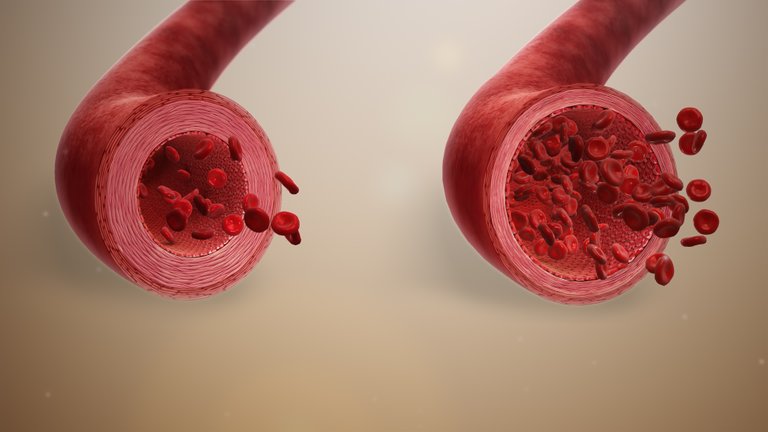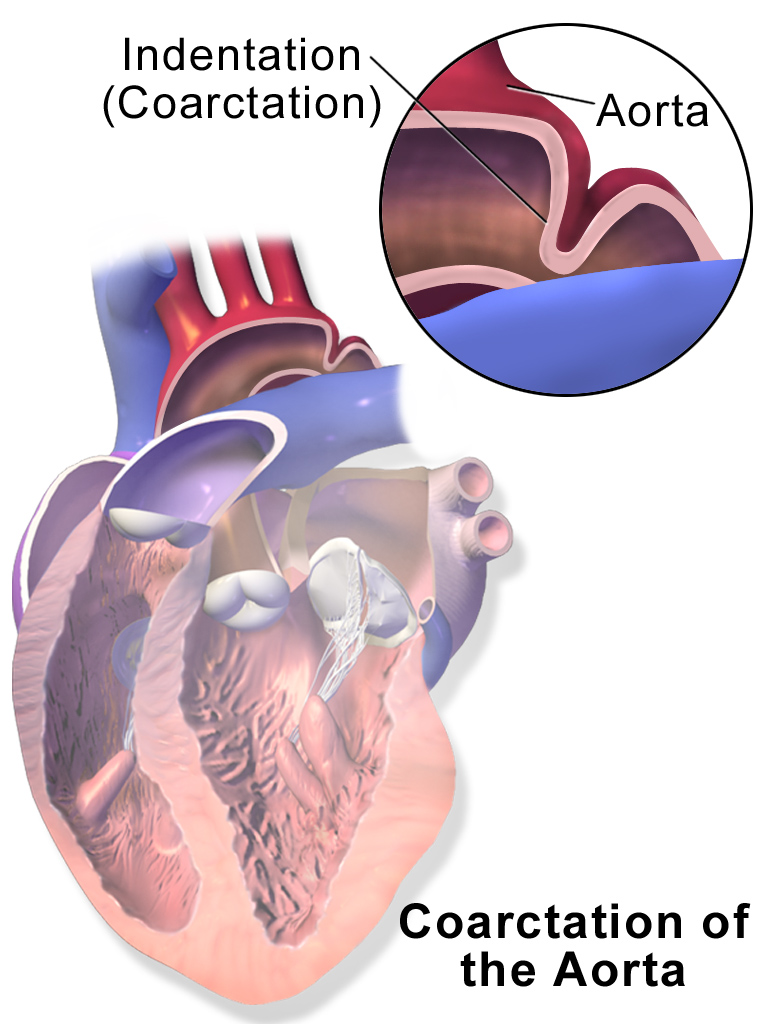Millions of people worldwide are affected by this condition called Hypertension. Also frequently known as "The Silent Killer". But why? Well, This condition can stealthily affect one's body's system for years without any symptoms. This can result in serious complications until any medical intervention is started. But, no worries, in this article, we are going to talk about its risk factors, causes, pathophysiology, treatment options, and much more. Let's get started.
 Credits: Wikipedia
Credits: WikipediaWhat Exactly is Hypertension?
Imagine you are pushing a wall, that's what blood does while moving through the blood vessel. It exerts a lateral pressure over the vessel's wall. The only difference here is vessel's wall is not as rigid as the wall you are pushing. This pressure is just normal blood pressure.
If this Pressure increases somehow, then it changes to high blood pressure or in other words "Hypertension". Everyone knows that normal blood pressure is 120/80 mmHg. When I say 120/80, I mean it should be below 120/80. You may ask why? Here is a chart to describe it better.
| BP Classification | Systolic BP | Diastolic BP |
|---|---|---|
| Normal | <120 | <80 |
| Pre-Hypertensive | 120-139 | 80-89 |
| Stage I Hypertension | 140-159 | 90-99 |
| Stage II Hypertension | >160 | >100 |
This classification is defined by JNC-9(Joint National Committee for Hypertension). This Chart tells us, if your BP is constantly above 120/80, you are already in a danger zone and might develop hypertension very soon if proper steps are not taken.
According to JNC-9, about 35% population is hypertensive, but recently, AHA or the American heart association published a new classification which tells us, stage I hypertension is above 130/90. which makes about 49% of the world's population hypertensive. You see this is controversial and many say, it was made to benefit big pharmaceuticals. In my opinion, JNC guidelines are more suitable for us and less suitable for big pharma.
The Reasons Behind Hypertension
Still, as of today most common reason behind hypertension is "idiopathic". It's just a fancy term that we doctors use when we don't know what exactly the cause is. This is known as Essential hypertension and is found in 90-95% of the total cases. There is no point in talking about essential hypertension. So, let's talk about secondary hypertension.
Rest 5-10% of cases are of secondary hypertension. This means hypertension is secondary to some other diseases. What diseases exactly?
If the person already has chronic kidney disease. This is the most important secondary factor for developing hypertension in near future. Other important reasons are atherosclerosis and fibromuscular dysplasia.
There is a condition called Metabolic syndrome X usually used to describe the obese person if they have these 5 features.
- Central obesity
- Increased Blood Sugar
- Sometimes uses anti-hypertensive medications
- Increased triglycerides level in blood.
- Decreased HDL levels which are good cholesterol.
If an obese person has Metabolic syndrome X, then there is a high probability of developing hypertension in a few years.
Also, if a person with Metabolic syndrome X also has some episodes of apnea (stopping of breathing) while sleeping. This is known as Metabolic Syndrome Z which is even more dangerous. Let me clarify more on this topic. How many episodes you must have exactly though? Well, it should be at least 5 episodes of apnea in 1 hour and each episode must be at least 10 sec long.
Can there be a congenital cause for hypertension?
 Credits: Wikipedia
Credits: WikipediaYes, Coarctation of the Aorta is the most common congenital cause which causes hypertension in adulthood. Don't worry, it's a defect in the aorta, in which some parts of the aorta are narrower than usual. When blood passes through a narrow area, Pressure increases.
Many people also ask, can hypertension be a genetic disease?
Well, Yes, Hypertension can be genetic in some conditions. Here are some genetic conditions.
- Liddle Syndrome
- Gordon Syndrome
- Polycystic Kidney Disease
In Liddle and Gordon Syndromes, The Channels that absorb Sodium and water from urine tend to overwork and increase the retention of salt and water which results in increased pressure.
In Polycystic kidney disease, The Filtration rate of the kidney is altered due to multiple cysts, This low filtration rate activates the RAAS system which I will describe later. Activation of the RAAS system leads to Hypertension.
When Does a Person Become a Hypertensive Patient?
This one question is frequently asked. All of us have some episodes of increased blood pressure in our life, maybe due to stress or some other reason. But does that makes us hypertensive?
No, there are a few criteria for being called a hypertensive patient.
See, a Normal person experiences something called a diurnal variation of Blood pressure. This means we have changes in the Blood pressure reading throughout the day. It is low at night and lowest at around 4-5 am in the morning and high in the day, with the highest around 12-1 pm noon.
When we examine the BP of a Hypertensive person throughout the day or 24 hours, we can see that this diurnal variation is lost. They experience high BP throughout the day. Okay, this was the 1st criterion, you need to lose the diurnal variation.
Here are a few more criteria.
- Night BP: > 120/80 mmHg
- Day BP: >130/85 mmHg
- Clinical BP: >140/90 mmHg
By clinical BP, I mean white-collar BP, it's due to the anxiety that one can have after visiting a hospital. Anyone of these should be recorded on more than 2-3 occasions, then the person can be considered a hypertensive patient.
Do you have the risk factors for Hypertension?
You can evaluate yourself after this. There are some modifiable and unfortunately some non-modifiable risk factors. Let's first talk about modifiable risk factors.
- Obesity
- You are not doing enough physical activities throughout the day.
- A very high salt diet.
- Too much fast food.
- Chronic Smoking
- Daily Stress
- Sleep apnea due to obesity.
Here are some un-modifiable risk factors:
Age: The risk increases with increasing age. The highly vulnerable age group is above 65 and gets even worse if there is any existing co-morbidity.
Family History
Gender: Recent study shows men tend to have a greater risk of hypertension than women.
Ethnicity
Unfortunately, you can't control these unmodifiable risk factors but you surely can control modifiable ones with strict and disciplined lifestyle modification. Always remember, if you are concerned about the risk factors, discuss them with your doctor in time.
That's it for this part-I of this article. I will explain further about its pathophysiology, treatment options, and much more in the next part. Hope you liked this one.
Previous Articles:
- Cystic Fibrosis: How a Genetic Mutation Disrupts the Body’s Essential Functions
- The Case of a Woman with Intermittent Vision Loss. [Case Study #1]
I find it interesting that people avoid salt to avoid hypertension, but they usually don't know that sodium is actually necessary in amounts that you won't ordinarily get from food unless you salt it, so in some cases, people who never salt their food and cook everything themselves, they might not be getting the RDA of sodium!
Hypertension is a serious issue, often seen amongst older adults, and it needs to be treated with every sense of urgency.
Absolutely true 👍
Thanks for your contribution to the STEMsocial community. Feel free to join us on discord to get to know the rest of us!
Please consider delegating to the @stemsocial account (85% of the curation rewards are returned).
Thanks for including @stemsocial as a beneficiary, which gives you stronger support.